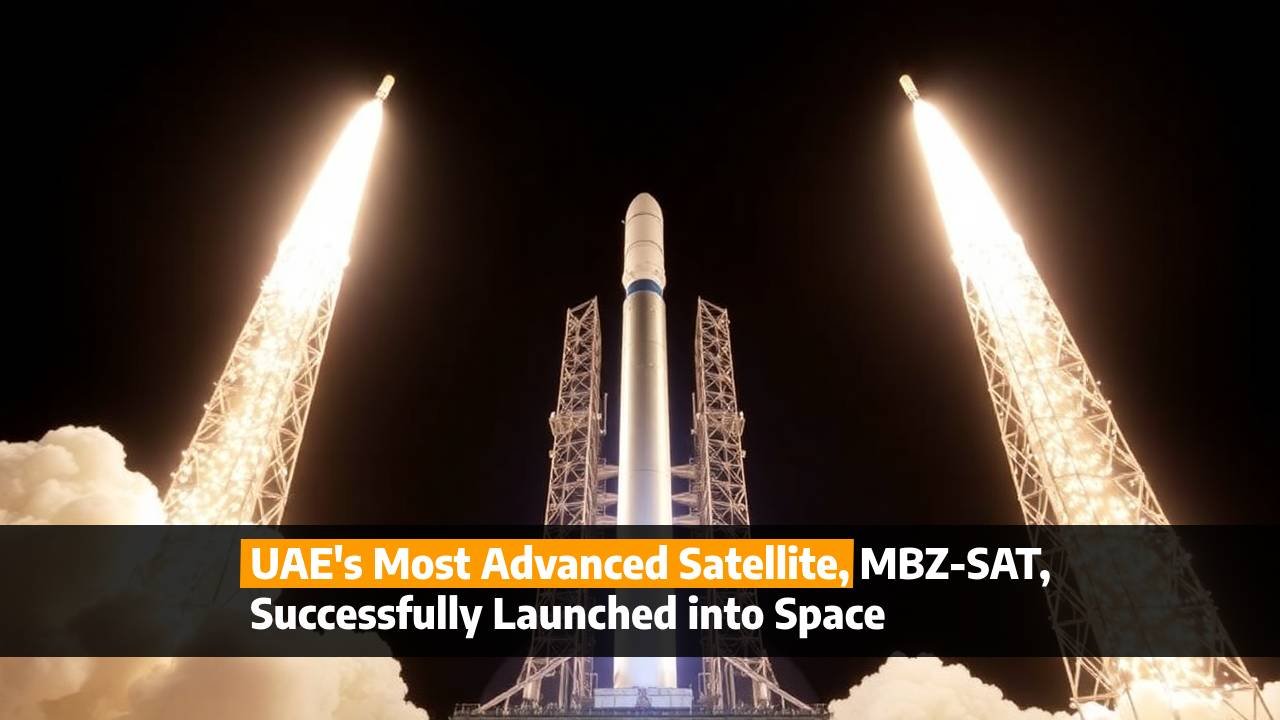In a historic moment for the UAE’s space ambitions, the country’s most advanced Earth-imaging satellite, MBZ-SAT, was successfully launched on Tuesday, January 14, at 11:09 PM local time. The liftoff took place at the Vandenberg Air Force Base in California, USA, aboard SpaceX’s Falcon 9 rocket. This remarkable achievement further cements the UAE’s position as a rising leader in the global space industry.
Sheikh Mohammed bin Rashid bin Mohammed bin Rashid Al Maktoum, grandson of the Dubai Ruler, was among the esteemed officials present at the mission control center in Dubai to witness this momentous event. The satellite’s launch was celebrated across the nation, with Burj Khalifa lighting up in a dazzling display, symbolizing the UAE’s pride and anticipation for the mission.
A New Era in Space Imaging
The MBZ-SAT, weighing 750kg and measuring 3m x 5m, is the second Emirati-built satellite to reach Earth’s orbit. It represents a significant leap in technological capability with twice the imaging accuracy of its predecessors, ten times more imagery output, and rapid data delivery. Equipped with advanced electric propulsion, precise navigation systems, and a high-resolution camera, the satellite is designed to support crucial applications such as environmental monitoring, infrastructure management, disaster relief, and water quality assessment.
The satellite’s low-Earth orbit, approximately 500km above the planet’s surface, ensures real-time data transfer with minimal lag. According to Mohammad AlBlooshi, Director of the Space Operations Department at the Mohammed Bin Rashid Space Centre (MBRSC), “The first signal will be received after approximately one hour and 22 minutes post-launch. Each contact will last about 10 minutes, allowing for efficient data transfer and processing.”
A Dual Mission with SpaceX’s Rideshare Program
The MBZ-SAT’s journey to space was facilitated through SpaceX’s rideshare program, which provides a cost-effective alternative to traditional satellite launches. Originally scheduled for October 2024, the launch faced delays due to technical issues but was successfully rescheduled and executed. Alongside MBZ-SAT, the compact CubeSat, HCT-SAT 1, developed by Emirati students, also joined the mission, reflecting the UAE’s commitment to nurturing the next generation of space explorers.
Driving Economic Growth and Knowledge Transfer
With 90% of the satellite’s components developed by UAE-based companies, MBZ-SAT stands as a testament to the country’s burgeoning aerospace ecosystem. The project involved collaborations with five leading domestic firms, including Mubadala-owned Strata, Falcon Group, Edge Group’s EPI, Halcon, and Rockford Xellerix. These partnerships have not only driven economic growth but also facilitated significant knowledge transfer, enhancing the UAE’s global competitiveness in space technology.
“This is a moment of pride for everyone in the UAE,” said Salem Humaid Al Marri, Director General of MBRSC. “We’ve launched two very different satellites at the same time – one a large, advanced satellite developed over years of experience, and another built to train students and foster their capabilities in the space industry.”
Rigorous Testing and Preparation
The MBZ-SAT’s development involved extensive testing to ensure mission success. After being fully assembled in the UAE, the satellite underwent rigorous scientific evaluations before being transported in a specialized container to South Korea for environmental testing. Following successful completion, the satellite was shipped to SpaceX’s facilities in the USA for final preparations.
Supporting the Nation and Beyond
The MBZ-SAT is now poised to deliver critical data for applications ranging from agriculture development to disaster management. Operated and monitored from the MBRSC’s space mission control room, it will play a pivotal role in advancing the UAE’s space exploration goals while contributing to global scientific and technological advancements.
The UAE’s Expanding Space Ambitions
Currently, the UAE has 10 satellites in orbit, with eight more under development. This growing satellite network underscores the nation’s dedication to becoming a global leader in space exploration. By integrating advanced technology and fostering local talent, the UAE continues to push boundaries and inspire future generations of innovators.
The successful launch of MBZ-SAT is not just a milestone for the UAE but a beacon of inspiration for the world, showcasing how determination, innovation, and collaboration can achieve extraordinary feats in the pursuit of scientific progress.

